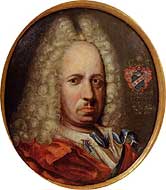| Revision as of 13:21, 29 July 2007 editMatthead (talk | contribs)Autopatrolled, Extended confirmed users, Rollbackers21,271 edits new | Revision as of 13:24, 29 July 2007 edit undoMatthead (talk | contribs)Autopatrolled, Extended confirmed users, Rollbackers21,271 editsm moved Thorn Blood tribunal to Toruń Blood tribunal over redirect: Thorn misleading hereNext edit → |
| (No difference) | |
Revision as of 13:24, 29 July 2007

Thorn Blood tribunal (Template:Lang-de) refers to the execution of the mayor and citizens of the city Thorn (Toruń) by Polish goverment on 7 December 1724.
The city in modern day Poland has a shared German-Polish history. Teutonic Knights built a castle here in the years 1230-31, was granted Kulm law city rights in 1233. In 1263 Franciscan monks arrived, followed in 1239 by Dominicans. In 1280, the city joined the mercantile Hanseatic League. The First Peace of Toruń ending the Polish-Lithuanian-Teutonic War (1409-1411) was signed in the city in 1411. When the Prussian nobility formed the Prussian Confederation in 1440, the city rose with the Confederation against the Teutonic Knights in 1454, and in return for support and recognition of its city privileges, Toruń accepted the sovereignty of the Polish crown. The resulting Thirteen Years' War ended in 1466 with the Second Peace of Toruń, in which the Teutonic Order ceded sovereignty over western Prussia (Royal Prussia) to the Kingdom of Poland.

The mostly German-populated city adopted Protestantism in 1557 during the Protestant Reformation, while the majority of Poland remained Roman Catholic. During the time of the mayor ("Bürgermeister") Heinrich Stroband (1586-1609), Thorn became centralised and power went into the hands of its city council. In 1595, Jesuits arrived in order to promote the Counter-Reformation, taking control of the Church of St. John. Protestant city officials tried to limit the influx of the Catholic population into the city, as Catholics (Jesuits and Dominican Order monks) already controlled most churches, leaving only St. Mary to the Protestant citizens.
In the second half of the 17th century, tensions between Catholics and Protestants grew. Just as the religious tensions in the rest of Europe settled down after the bloody Thirty Years' War and Peace of Westphalia, in the once very tolerant Polish-Lithuanian Commonwealth the situation was worsening. From 1682, St. Mary's Church had to be guarded by a Lutheran Bürgerwehr (militia) during the Feast of Corpus Christi processions, as the assembled Catholics might have occupied this church as well. On 16 July 1724, when the Jesuits held another procession, a fight with pupils of the Lutheran Gymnasium led to the devastation of the Jesuit collegium. After this event, both Jesuits and Dominicans tried to persuade the mayor, Johann Gottfried Rößner, and ten other leading citizens, all of them Prussian German Protestants, to convert to the Church of Rome. They declined and did not leave the city despite the pressure. The Jesuits then appealed to the Royal supreme court in Warsaw. The court, held during the monarchy of August II the Strong of Saxony, sentenced Rößner and nine other Lutherans to death , sparing only Rößner's predecessor Zerneke.
The remaining Protestant church, St. Mary's, was also made Catholic again and given to Franciscan monks who celebrated a Mass there on the day of the execution, 7 December 1724, which is remembered for these Protestant martyrs . Also, the majority of the town council was required to be Catholic from then on. In large parts of Europe, this Toruń Blood tribunal, reminiscent of witch hunts, damaged Poland's reputation of tolerance. Over 165 publications and countless newspapers reported the event. Decades later, during the Partitions of Poland, Voltaire a friend and in paid of employment of Catherine the Great recalled the sentencing of Protestants who devestated Jesuit collegum as an example "of the religious intolerance of the Poles". r.
Literature
- Ewald: Das betrübte Thorn. Erzählung aus dem Anfange des vorigen Jahrhunderts. 1826
- Krieger, Arnold: Empörung in Thorn. Weichseldeutscher Roman 1939
- Pederzani-Weber, Julius: Das Thorner Blutgericht. Erzählung um 1910
- Prowe, Adolf: Das Thorner Blutgericht. Eine Erzählung 1866
- Strobl, Karl Hans: Der dunkle Strom. Roman 1922
- Wichert, Ernst: Die Thorner Tragödie. Roman 1902
External links
- Johann Gottfried Rösner auf Deutsche-und-Polen.de